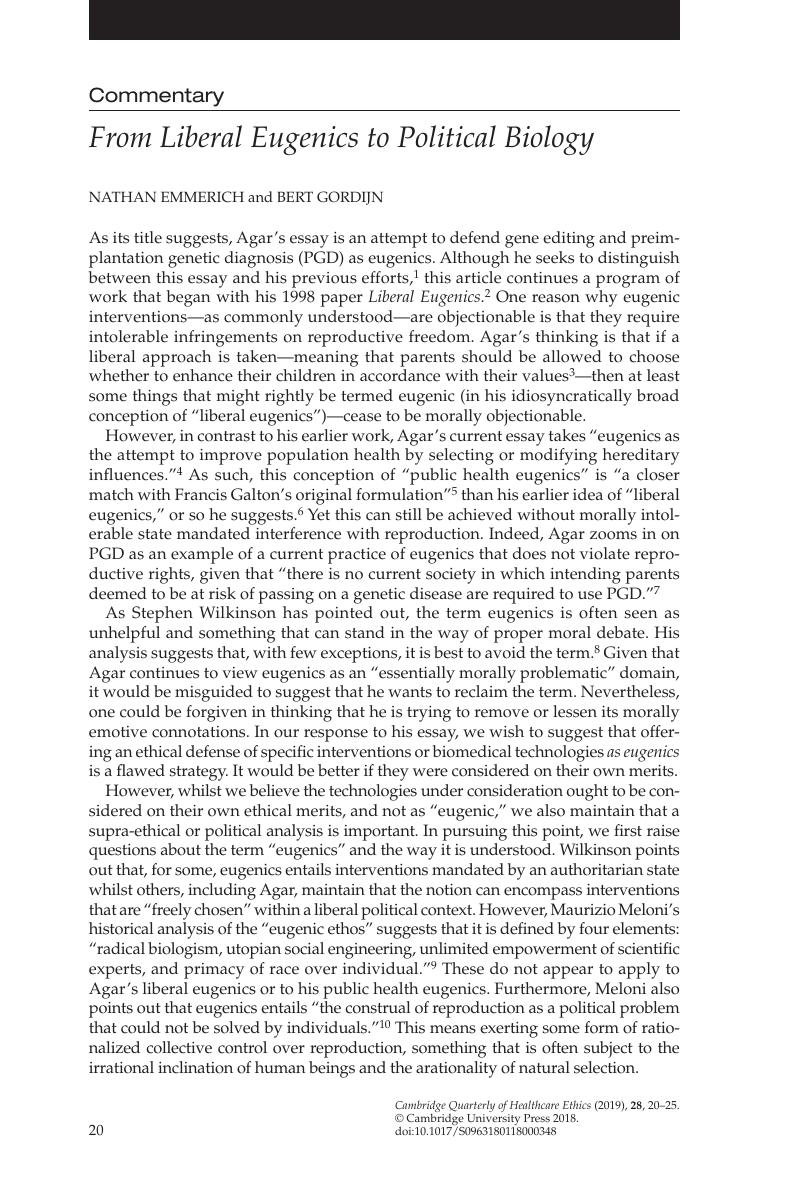Published online by Cambridge University Press: 20 December 2018

1. Agar, N. Why we should defend gene editing as eugenics. Cambridge Quarterly of Healthcare Ethics 2018; this issue. fn.3Google Scholar
2. Agar, N. Liberal eugenics. Public Affairs Quarterly 1998;12(2):137–55.Google ScholarPubMed
3. See note 2, Agar 1998.
4. See note 1, Agar 2018.
5. See note 1, Agar 2018.
6. See note 1, Agar 2018, note 3.
7. See note 1, Agar 2018. It is worth noting that Agar’s argument is that if a eugenic intervention is to be ethical, other necessary conditions must be fulfilled as well as the absence of state compulsion. For example, it must be based on sound science.
8. Wilkinson, S. ‘Eugenics talk’ and the language of bioethics. Journal of Medical Ethics 2008;34(6):467–71.CrossRefGoogle Scholar
9. Meloni, M. Political Biology: Science and Social Values in Human Heredity From Eugenics to Epigenetics. Basingstoke, Hampshire: Palgrave Macmillan; 2016:92.Google Scholar
10. See note 9, Meloni 2016,72.
11. Mayes, C. The Biopolitics of Lifestyle: Foucault, Ethics and Healthy Choices. New York: Routledge; 2015.CrossRefGoogle Scholar
12. See note 9, Meloni 2016.
13. See note 1, Agar 2018.
14. Francis Galton, Inquiries into Human Faculty and its Development (London: Macmillan, 1883), p. 17, fn 1; cited in Agar 2018 (see note 1).
15. Agar suddenly introduces PGD into his analysis next to gene editing. As it turns out the paper is really more about PGD than gene editing.
16. See note 1, Agar 2018.
17. See note 1, Agar 2018.
18. See note 1, Agar 2018.
19. See note 1, Agar 2018.
20. See note 1, Agar 2018.
21. Nuffield Council on Bioethics Working Group. Non-invasive Prenatal Testing: Ethical Issues. London: Nuffield Council on Bioethics; 2017.
22. Rapp, R. Testing Women, Testing the Fetus: The Social Impact of Amniocentesis in America. New York: Routledge; 1999;Google Scholar Verbeek, P-P. Obstetric ultrasound and the technological mediation of morality: A postphenomenological analysis. Human Studies 2008;31(1):11–26;CrossRefGoogle Scholar Verbeek, P-P. Moralizing Technology: Understanding and Designing the Morality of Things. Chicago: University of Chicago Press; 2011.CrossRefGoogle Scholar
23. Bosk, CL. All God’s Mistakes: Genetic Counseling in a Pediatric Hospital. Chicago: Chicago University Press; 1995.Google Scholar